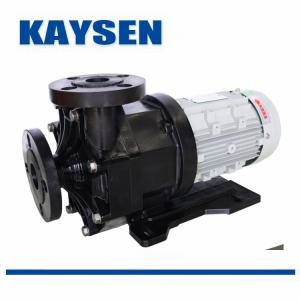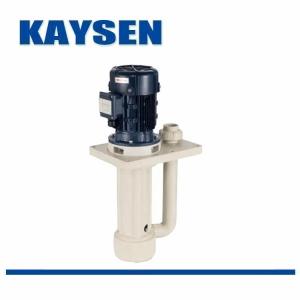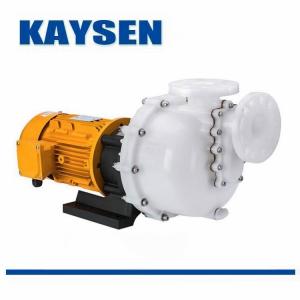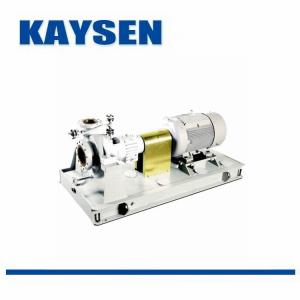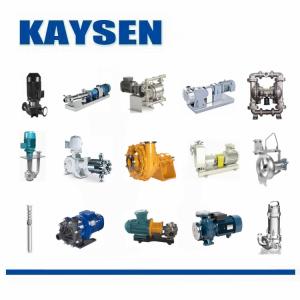
|
- 品牌:德國KAYSEN
- 貨號:KS7995679
- 發(fā)布日期: 2019-10-12
- 更新日期: 2025-05-22
| 外型尺寸 | |
| 貨號 | KS7995679 |
| 品牌 | KAYSEN |
| 用途 | 抽水、化工,、制藥,、石油、冶金,、染料、冶煉,、電力,、電鍍、農藥,、造紙,、食品、紡織等行業(yè)酸洗工藝,、制酸制堿,、噴漆工藝、有色金屬冶煉中的電解液輸送,、離子膜項目中的氯水輸送,、廢水處理、電鍍,、農藥領域,。 |
| 型號 | KAYSEN |
| 工作壓差 | 0 |
| 壓力環(huán)境 | 常壓 |
| 介質溫度 | 250℃ |
| 驅動方式 | 電動 |
| 適用介質 | 水 |
蒸汽往復泵-往復泵-KAYSEN泵業(yè)
GERMANY KAYSEN PUMP CO .,LTD
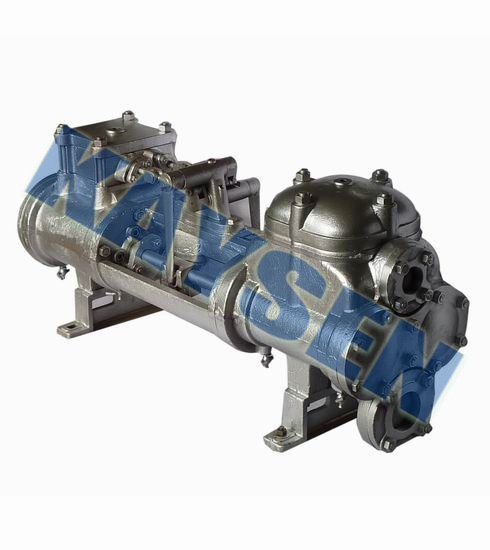
凱森電動往復泵是用蒸汽為動力,根據(jù)唧筒原理作用的一種抽水設備,。各種蒸汽往復泵的汽缸工作壓力為1.4Mpa,,排出壓力為1.7Mpa,適用于飽和蒸汽和過熱蒸汽,,氣溫不超過200℃,。
各種蒸汽往復泵所配水缸活塞環(huán),只適用于水溫不能超過60°C,,超過該溫度而在105°C以內者,,須換掉優(yōu)質帆布夾層填料來制選水缸活塞環(huán)。各種蒸汽往復泵的理論吸程為10.3米,,但實際使用時吸水揚程包括管道阻力在內不應超過7米,,當抽吸熱水時吸水揚程隨水溫升高而降低,若水溫過高或管道阻力過大,,進水池*水位須高于蒸汽泵的汽缸,、水缸平直中心線。
主要特點:
●泵的排出壓力取決于蒸汽壓力,由于汽缸面積比水缸面積一般要大2~2.5倍,,因此能獲得較高的壓力,。如不計磨擦阻力損失,在水缸活塞上能產(chǎn)生2~2.5倍鍋爐蒸汽壓力的水壓力,。
●泵的流量取決于蒸汽的流量,,調節(jié)比較方便。這種泵不能用調節(jié)出水管上閥門的開度的節(jié)流方法來調節(jié)流量,。一般用調節(jié)進汽閥門的開度來調節(jié)流量,,也可以用出水管旁路回流到進水管的辦法調節(jié)流量。這種泵能適應較大的負荷變化,。
●有較高的效率,,一般可達80%~95%。
但蒸汽往復泵結構笨重,,體型較大,傳動機構復雜,,操作較麻煩,,耗用蒸汽多,成本較高,。由于這些原因,,基本上已不用蒸汽往復泵作為鍋爐的主要給水設備,一般只作為停電時的備用泵,。但有些鍋爐房考慮省煤器的連續(xù)進水,,仍把便于調節(jié)流量的蒸汽往復泵作為鍋爐的日常給水設備。
2QS(QB)型臥式雙缸,、雙作用,、活塞式蒸汽往復泵是以蒸汽為動力,根據(jù)唧筒原理作用的一種抽水設備,。它的主要優(yōu)點是結構簡單,,安裝、使用和維護方便,。只要連接上蒸汽和進出水管道即可使用,,既可用于一般輸水,也可用于中小型鍋爐給水,。如調換缸內活塞和某些零件,,亦可用于煉油廠輸送石油產(chǎn)品、礦井排水等,。
各種蒸汽泵的汽缸工作壓力為1.4Mpa,,溫度不超過200℃,*排出壓力為1.7Mpa,,被輸送液體常溫為60℃,,泵啟動蒸汽壓力不低于0.3Mpa,適用于飽和蒸汽和過熱蒸汽.
主要應用:
●中小型鍋爐給水
●煉油廠輸送石油產(chǎn)品
●礦井排水
蒸汽往復泵故障及處理方法:
蒸汽往復泵在運行中會出現(xiàn)各種問題,,要及時維護與保養(yǎng),才能保證正常運行,。先把生產(chǎn)中可能出現(xiàn)問題的現(xiàn)象,、原因及處理方法匯總如下:
一、泵開不動
原因:
(1) 進汽閥閥芯折斷,,使閥門打不開
(2)汽缸內有積水
(3) 搖臂銷脫落或圓錐銷切斷
(4) 汽,、油缸活塞環(huán)損壞
(5) 汽缸磨損間隙過大
(6) 汽門閥板、閥座接觸不良
(7) 蒸汽壓力不足
(8) 活塞桿處于中間位置,,致使汽門關閉
(9) 排出閥閥板裝反,,使出口關死
處理方法:
(1) 更換閥門或閥芯
(2) 打開放水閥,排除缸內積水
(3) 裝好搖臂銷和更換圓錐銷
(4) 更換汽油缸活塞環(huán)
(5) 更換汽缸或活塞環(huán)
(6) 刮研閥板及閥座
(7) 調節(jié)蒸汽壓力
(8) 調整活塞桿位置
(9) 重將排出閥安裝正確
二,、泵抽空
原因:
(1) 溫度太高產(chǎn)生汽化,,或液面過低吸入氣體
(2) 閥未開或開得小
(3) 活塞螺帽松動
(4) 由于閥墊片吹壞使進出口被連通
(5) 油缸套磨損,活塞環(huán)失靈
處理方法:
(1) 降低溫度,,保證一定液面或調節(jié)往復次數(shù)
(2) 打開閥至一定開度或調節(jié)往復次數(shù)
(3) 上緊活塞螺帽
(4) 更換閥墊片
(5) 更換缸套或活塞環(huán)
三,、產(chǎn)生響聲或振動
原因:
(1) 活塞沖程過大或汽化抽空
(2) 活塞螺帽或活塞桿螺帽松動
(3) 缸套松動
(4) 閥敲碎后,碎片落入缸內
(5) 地腳螺釘松動
(6) 十字頭中心架連接處松動
處理方法:
(1) 調節(jié)活塞沖程和往復次數(shù)
(2) 擰緊活塞螺帽和活塞桿,螺帽
(3) 擰緊缸套螺絲
(4) 掃除缸內碎片,更換閥
(5) 固定地腳螺栓
(6) 修理或更換十字頭
四、壓蓋漏油,、漏氣
原因:
(1) 活塞桿磨損或表面不光滑
(2) 填料損壞
(3) 填料壓蓋未上緊或填料不足
處理方法:
(1) 更換活塞桿
(2) 更換填料
(3) 加填料或上緊壓蓋
五,、汽缸活塞桿過熱
原因:
(1) 注油器單向閥失靈
(2) 潤滑不足
(3) 填料過緊
處理方法:
(1) 更換單向閥
(2) 加足潤滑油
(3) 松填料壓蓋
六、壓力不穩(wěn)
原因:
(1) 閥關不嚴或彈簧彈力不均勻
(2) 活塞環(huán)在槽內不靈活
處理方法:
(1) 研磨閥或更換彈簧
(2) 調整活塞環(huán)與槽的配合
七,、流量不足
原因:
(1) 閥不嚴
(2) 活塞環(huán)與缸套間隙過大
(3) 沖程次數(shù)太少
(4) 沖程太短
處理方法:
(1) 研磨或更換閥門,調節(jié)彈簧
(2) 更換活塞環(huán)或缸套
(3) 調節(jié)沖程數(shù)
(4) 調節(jié)沖程 等

Germany Kaysen electric reciprocating pump is a pumping device that uses steam as the power and acts according to the principle of the cylinder. The various steam reciprocating pumps have a cylinder working pressure of 1.4 MPa and a discharge pressure of 1.7 MPa, which is suitable for saturated steam and superheated steam, and the temperature does not exceed 200 °C.
The piston rings of various steam reciprocating pumps are only suitable for water temperature not exceeding 60 °C. If the temperature exceeds 105 °C, the high-quality canvas sandwich packing should be replaced to select the cylinder piston ring. The theoretical suction stroke of various steam reciprocating pumps is 10.3 meters, but in actual use, the suction head should not exceed 7 meters including pipe resistance. When the hot water is pumped, the suction head decreases with the increase of water temperature, if the water temperature is too high. Or the pipeline resistance is too large, the minimum water level in the inlet pool must be higher than the flat center line of the cylinder and the water tank of the steam pump.
main feature:
● The discharge pressure of the pump depends on the steam pressure. Since the cylinder area is generally 2 to 2.5 times larger than the cylinder area, a higher pressure can be obtained. If the frictional resistance loss is not counted, a water pressure of 2 to 2.5 times the boiler steam pressure can be generated on the cylinder piston.
●The flow rate of the pump depends on the flow rate of the steam, and the adjustment is convenient. This type of pump cannot regulate the flow by a throttling method that regulates the opening of the valve on the outlet pipe. Generally, the opening of the inlet valve is adjusted to adjust the flow rate, and the flow rate can also be adjusted by bypassing the outlet pipe to the inlet pipe. This pump can accommodate large load changes.
● It has high efficiency, generally up to 80% to 95%.
However, the steam reciprocating pump has a cumbersome structure, a large body shape, a complicated transmission mechanism, troublesome operation, high steam consumption, and high cost. For these reasons, the steam reciprocating pump has basically not been used as the main water supply device of the boiler, and generally only serves as a backup pump at the time of power failure. However, some boiler houses consider the continuous water intake of the economizer, and still use the steam reciprocating pump that is convenient to adjust the flow rate as the daily water supply equipment of the boiler.
2QS (QB) horizontal double-cylinder, double-acting, piston-type steam reciprocating pump is a kind of pumping equipment that is powered by steam and acts according to the principle of the cylinder. Its main advantages are its simple structure and its ease of installation, use and maintenance. It can be used as long as it is connected to steam and water inlet and outlet pipes. It can be used for both general water supply and medium and small boiler feed water. Such as the replacement of the cylinder piston and some parts, it can also be used in oil refineries to transport petroleum products, mine drainage and so on.
The working pressure of the cylinders of various steam pumps is 1.4Mpa, the temperature does not exceed 200°C, the maximum discharge pressure is 1.7Mpa, the normal temperature of the liquid to be transported is 60°C, and the steam pressure of the pump starts is not less than 0.3Mpa. It is suitable for saturated steam and superheated steam. .
main application:
●Small and medium boiler water supply
●Refinery transports petroleum products
● Mine drainage
Steam reciprocating pump failure and treatment methods:
Steam reciprocating pumps will have various problems during operation, and timely maintenance and maintenance will ensure normal operation. First summarize the phenomena, causes and treatments that may cause problems in production as follows:
First, the pump does not move
the reason:
(1) The inlet valve spool is broken, so that the valve cannot be opened.
(2) There is water in the cylinder
(3) Rocker pin off or taper pin cut
(4) Damage to the piston rings of steam and cylinder
(5) Excessive cylinder wear clearance
(6) Poor contact between valve disc and valve seat
(7) Insufficient steam pressure
(8) The piston rod is in the middle position, causing the valve to close
(9) The discharge valve valve plate is reversed, so that the outlet is closed.
Approach:
(1) Replace the valve or spool
(2) Open the drain valve to remove water from the cylinder
(3) Install the rocker pin and replace the taper pin
(4) Replace the petrol cylinder piston ring
(5) Replace the cylinder or piston ring
(6) Grinding valve plate and seat
(7) Adjusting steam pressure
(8) Adjust the position of the piston rod
(9) Reinstall the discharge valve correctly
Second, pump pumping
the reason:
(1) The inlet temperature is too high to produce vaporization, or the liquid level is too low to draw in gas
(2) The inlet valve is not open or opened small
(3) The piston nut is loose
(4) The inlet and outlet are connected because the inlet valve gasket is blown
(5) The cylinder liner is worn and the piston ring is out of order
Approach:
(1) Reduce the inlet temperature, ensure a certain liquid level or adjust the number of reciprocating times
(2) Open the inlet valve to a certain opening degree or adjust the number of reciprocating times
(3) Tightening the piston nut
(4) Replace the inlet valve gasket
(5) Replace the cylinder liner or piston ring
Third, produce a sound or vibration
the reason:
(1) Excessive piston stroke or vaporization evacuation
(2) Loose piston nut or piston rod nut
(3) Loose cylinder liner
(4) After the valve is broken, the debris falls into the cylinder
(5) Loose ground screws
(6) The crosshead center frame connection is loose
Approach:
(1) Adjust piston stroke and number of reciprocations
(2) Tighten the piston nut and piston rod, nut
(3) Tighten the cylinder cover screws
(4) Remove the debris in the cylinder and replace the valve
(5) Fixed anchor bolt
(6) Repair or replace the crosshead
Fourth, the gland leaks oil, leaks
the reason:
(1) The piston rod is worn or the surface is not smooth
(2) Damage to the packing
(3) The packing gland is not tightened or insufficient packing
Approach:
(1) Replace the piston rod
(2) Replace the packing
(3) Filling or tightening the gland
Five, cylinder piston rod overheating
the reason:
(1) Oiler check valve fails
(2) Insufficient lubrication
(3) The packing is too tight
Approach:
(1) Replace the check valve
(2) Add enough lubricant
(3) Loose packing gland
Sixth, the pressure is unstable
the reason:
(1) The valve is not tight or the spring force is uneven
(2) The piston ring is not flexible in the groove
Approach:
(1) Grinding valve or replacement spring
(2) Adjust the fit of the piston ring to the groove
Seven, insufficient traffic
the reason:
(1) The valve is not strict
(2) The clearance between the piston ring and the cylinder liner is too large
(3) too few strokes
(4) Stroke is too short
Approach:
(1) Grinding or replacing the valve, adjusting the spring
(2) Replace the piston ring or cylinder liner
(3) Adjust the number of strokes
(4) Adjusting stroke, etc.
 位于Schw?bischGmünd的凱森Kaysen泵業(yè)有限公司是世界*的各種流體水泵和隔膜泵制造商之一,。60多年來,凱森以“制造”的可靠性和質量達到了*標準,。憑借我們全面的產(chǎn)品組合,,我們支持世界各地的客戶成功掌握供水,采礦,,工業(yè),,化工,造紙,,電力,,食品,制藥,,污水和海上行業(yè)的苛刻抽水任務,。作為上述領域創(chuàng)新技術的*供應商,我們是液體需要安全,,高效和經(jīng)濟運輸?shù)?合作伙伴,。
位于Schw?bischGmünd的凱森Kaysen泵業(yè)有限公司是世界*的各種流體水泵和隔膜泵制造商之一,。60多年來,凱森以“制造”的可靠性和質量達到了*標準,。憑借我們全面的產(chǎn)品組合,,我們支持世界各地的客戶成功掌握供水,采礦,,工業(yè),,化工,造紙,,電力,,食品,制藥,,污水和海上行業(yè)的苛刻抽水任務,。作為上述領域創(chuàng)新技術的*供應商,我們是液體需要安全,,高效和經(jīng)濟運輸?shù)?合作伙伴,。
凱森始終堅持“重質量,講信譽”為宗旨。產(chǎn)品現(xiàn)暢銷全國各地,,并已逐步開發(fā)海外市場,。公司多次被評為“重合同講信用”企業(yè),深得用戶的信賴和廣泛的贊譽,。
The Kaysen Pumps GmbH in Schw?bischGmünd, Germany, is one of the world's leading manufacturers of fluid centrifugal pumps and diaphragm pumps. For more than 60 years, Kaisen has achieved the highest standards of reliability and quality of "Made in Germany". With our comprehensive product portfolio, we support customers around the world to successfully grasp the harsh pumping tasks of water supply, mining, industry, chemical, paper, electricity, food, pharmaceutical, sewage and marine industries. As a leading provider of innovative technology in these areas, we are the perfect partner for liquids to be safe, efficient and economical to transport. ,
Germany Kaysen always adhere to the "quality, stresses credibility" for the purpose. Products are selling all over the country, and has gradually developed overseas markets. The company has repeatedly been rated as "the contract with the letter" business, won the trust of users and extensive praise.



